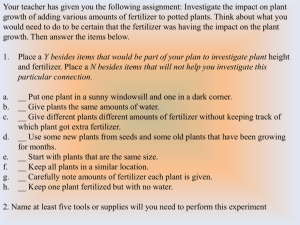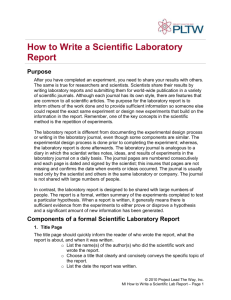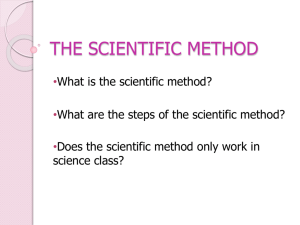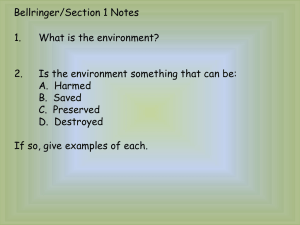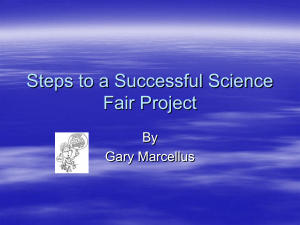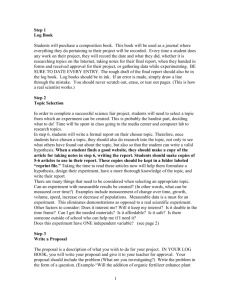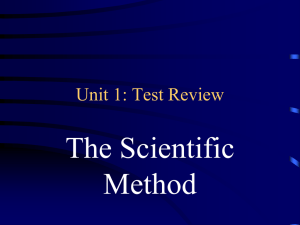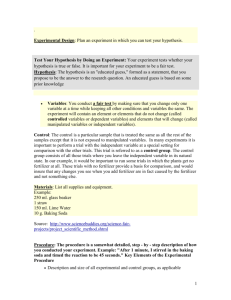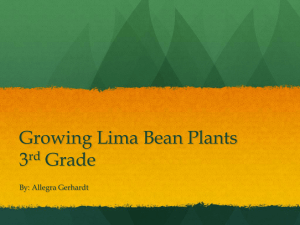ScienceFair
advertisement
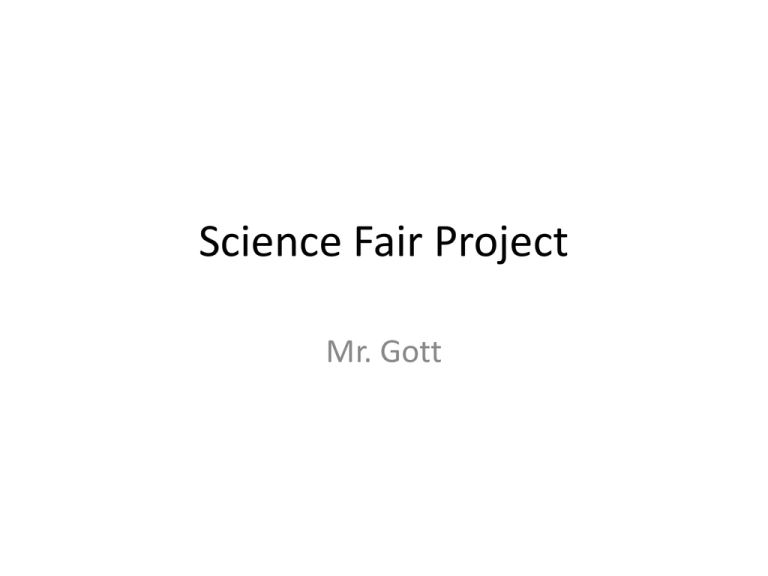
Science Fair Project Mr. Gott Problem Statement • This is the question you want answered. It should be written as a question. – Example: Do plants grow better with fertilizer? Background Information • Ok so you’ve come up with an idea…but is it worth doing a whole project on it? • This is where research comes in… • Scholarly books, articles and websites • Search Engine vs. Website • If you can back it up, you can do it! • This is in paragraph form Hypothesis: • This is your prediction about the outcome of your experiment. • It should be written as an if/then statement. • Example: If fertilizer is added to lima bean plants then the fertilized plants will grow larger than lima bean plants without fertilizer. Experimental Design • How are you going to do this? • Put your ideas together • Plan out your experiment: How much time do you need? How much material does it require? Can you put this together? Variables and Controls • Identify the following in your experiment: – Independent variable: This is the variable you change in your experiment • Example: adding fertilizer to lima beans – Dependent variable: This is the variable that changes because of the RESULTS of your experiment. • Example: the height of the lima bean plants – Control: This is the group without an independent variable • Example: the plants without fertilizer – Constants: Everything that you intentionally did not change as part of your experiment • Example: Sunshine, water, soil, time of day, etc. *Listed on power point* Experimentation • You picked a topic, you’ve got your idea and you can test it…Great, now actually do it!!! • Remember you have to have at least 3 trials…you don’t just do the experiment once! • The three trials can be shown in pictures or in charts Materials • This is a list of all the materials you used in your experiment Data • Once you do your experiment remember to write down your findings: Journal, Chart, Data table – there are your rough notes; For Example: • • • • • • • • • • 11/15/04 Control Plant 7.4 mm Test Plant 16.2 mm Test Plant 24.9 mm Test Plant 37.2 mm 11/22/04 Control Plant 7.8 mm Test Plant 15.9 mm Test Plant 23.2 mm Test Plant 37.2 mm • THEN….you have to do something with it! What to do with Data? • You must include at least one data table and at least one graph. • You must have some sort of statistical analysis for your data. This can be as simple as calculating the mean (average), median, mode, or as complicated as a statistical test. From Data to Results • From your data you get your results…what did you find? • Example: Does your plant hate salt water, or the way you sing? • The results is usually in the form of a statement that explains or interprets the data. You do not go into any detail or explanations here. You simply say in words what your data is telling you. Example: "Test Plant 3 showed little difference in growth rate as compared to the Control Plant." Procedures • List step-by-step instructions someone else can use to complete your experiment exactly as you did it. • Example: "After 1 minute, I stirred in the baking soda and timed the reaction to be 45 seconds Conclusion • This part is LONG…it’s supposed to be! • The conclusion is a summary of the research and the results of the experiment. (paragraphs) • This is where you answer your research question. You make a statement of whether your data supported your hypothesis or not. • You may have data that supported part of your hypothesis and not another part. You may also have data that did not support your hypothesis at all. • In this case, you may explain why the results were different. Applications • Explain in a paragraph why your experiment is important and how people can use the results of your experiment to make their lives better. • Who really cares? Why is it important to the world or to you? Resources/Bibliography • Where did you get your information? Include any and all sources such as: • Articles • Websites • Books • Interviews All need to be cited CORRECTLY! Visual display and Oral Presentation • If possible, turn your project in on PowerPoint. Follow this example as a guide. Your power point NEEDS to have all the parts! • You will need to present your project in front of the class. Please note that there will be NO prompting from the teacher. Practice your speech. You need to sound like you know what you’re talking about. Your Display Board • Guidelines for Display Board • This is a Tri-fold display board that exhibits the highlights of your Science Project. This is the first thing a person sees when they are introduced to your project so the presentation of this component of your Science Project is one of the most important. • Follow the guidelines illustrated below for dimensions of your DISPLAY BOARD as well as the placement of objects on the DISPLAY BOARD. Display Board Continued • SIDE A This side has the PROBLEM STATEMENT, The BACKGROUND INFORMATION and your HYPOTHESIS. SIDE B This side has the TITLE as well as all your DATA (including tables, diagrams and photos. SIDE C This side has the MATERIALS, PROCEDURE as well as your RESULTS and CONCLUSION followed by your BIBLIOGRAPHY. The Title of your Science Project is the first thing people will see when they look at your DISPLAY BOARD. You can use your QUESTION as your title or you can make up something. You want the title to be catchy and to make people interested in looking at your project.
